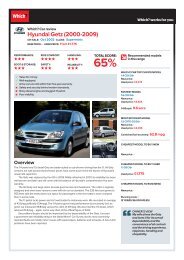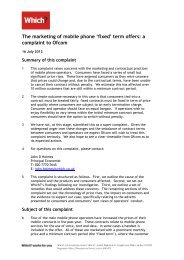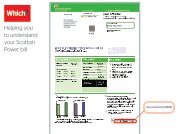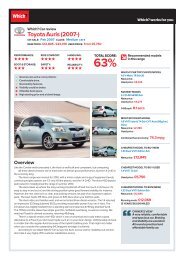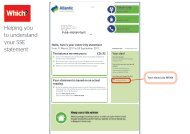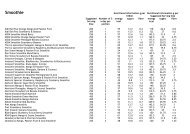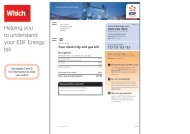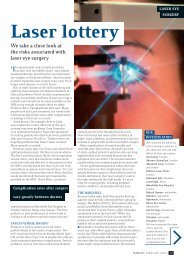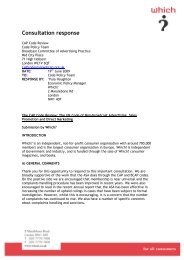Savings and Investments - Magazine
Savings and Investments - Magazine
Savings and Investments - Magazine
- No tags were found...
Create successful ePaper yourself
Turn your PDF publications into a flip-book with our unique Google optimized e-Paper software.
16The stock marketMake the stock marketwork for youIf you are keen to go it alone, we show youhow to deal directly on the stock marketDealing directly on the stockmarket is riskier than buyingshares through pooledinvestment funds, such as unittrusts <strong>and</strong> investment trusts.These options have you poolingyour savings with other saversin many companies, rather thangoing it alone.If you decide to buy <strong>and</strong> sellshares yourself, you’re the onemaking the decisions. Thismeans you need patience toresearch companies <strong>and</strong> theconfidence to invest yourown money.How do I go aboutshare dealing?When buying or selling shares,you normally have to dealthrough a stockbroker or aninvestment manager licensedto carry out share dealings.You can search for brokersusing the Association of PrivateClient Investment Managers<strong>and</strong> Stockbrokers members’directory (www.apcims.co.uk).The London Stock Exchangealso provides a members list.There are three types ofbroker service. The deluxeoption is a full advisory service,where the broker looks at yoursituation <strong>and</strong> constructs adiversified share portfolio tomeet your financial objectives.They won’t take any investmentdecisions without your consent.A discretionary service givesbrokers the authority to tradeshares without consulting youevery time.The third option is anexecution-only service, wherethe broker takes your order <strong>and</strong>executes it, but doesn’t giveadvice. The onus is on you topick the best shares to invest in.You’ll usually be charged a feefor each transaction (say, £15)<strong>and</strong> there might be a regular feefor having a trading account.Certificates or electronicshares?You can choose to hold sharesin certificates or in paperlessform. With the more traditionalmethod of certificates, you buyshares <strong>and</strong> get a certificate ofownership. If you hold sharecertificates, you’ll receive allcommunication, such as theannual reports, directly fromthe company. However,certificates can createproblems over time.Deals are settled (paid for)three working days after a dealso, with the post, it’s difficult toget certificates (if you’re selling)or money (if you’re buying) toyour broker in time <strong>and</strong> dealscan take up to 10 days. Manystockbrokers give longer tosettle with certificates, butcharge extra for this.The most common methodof electronic dealing isthrough nominee accountsheld with a broker. When youbuy shares, your broker is listedas the legal owner, but holdsthe shares in trust for you. Youhave a deposit account withthe broker to pay for purchasesor pay by debit card. There areno time-related problems with anominee account. Holdingshares this way usually allowsdeals to be settled within threedays. Your broker acts as ago-between, dealing withadministration <strong>and</strong> passing onannual reports, dividends <strong>and</strong>details of any share perks.If you are an experiencedinvestor, consider becoming amember of Crest (an electronicshare-settlement system). Thisallows you to hold shares inyour own name in electronicform. You must be sponsored bya broker, who may charge anannual fee, though this may bewaived if you trade regularly.www.which.co.uk



